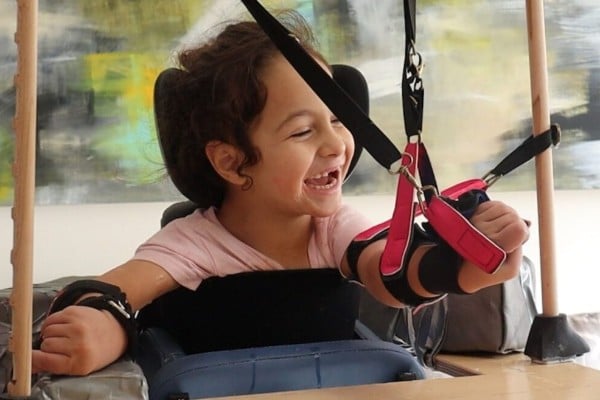An international movement based in Tel Aviv is bringing innovation to people with disabilities.
By Pesach Benson, United With Israel
Shani Sigman, a five-year-old girl with cerebral palsy, wanted to draw and paint, but lack of strength and dexterity in her hand made this activity too difficult.
Fortunately, Tikkun Olam Makers, a Tel Aviv-based nonprofit, organized a hackathon where a special prosthesis was designed. ‘(Tikun Olam’ is Hebrew for ‘Repairing the World.’) In most circumstances, this would be a happy ending.
But for Tikkun Olam Maker’s founder, Gidi Grinstein, that prosthesis — and other devices developed by the organization’s volunteers — is part of a bigger plan. Tikkun Olam Makers (or TOM for short) wants to help 250 million people with disabilities by creating a library of plans for 2,500 products with instructions on how to achieve this goal.
“Now, someone else in the world with the same disability can search and see if the library has a solution to their problem. They can take the product portfolio to a maker, paid or volunteer, where they live, and that person can make it,” Grinstein told Globes.
“Our intention is to build a product portfolio that will allow a person who isn’t necessarily an expert in medical devices to make a product to order easily, including whatever customization the end consumer requires. This way, we save on the price differences between different countries and shipping costs. People can even manufacture for their family members, or in some cases, for themselves.”
He added that TOM already has “50 portfolios for finished products and hundreds for prototypes” and that the organization welcomes suggestions for future hackathons.
Grinstein gave an example of how the volunteerism and shared wisdom connected to benefit three different people.
“A team of students at Shenkar [College in Tel Aviv] developed a prosthesis that allowed a girl named Yael whose hand had been amputated to play the violin. But this product didn’t start with the violin. It was because of a handless disabled veteran named Noam who wanted to cook and use a knife and fork. He couldn’t do this with the very expensive prosthetic he’d been given by the Ministry of Defense,” he told Globes.
“Meanwhile, in Singapore we met a handless fellow named Boon, who desperately wanted to go to the bathroom by himself. After the team working on Noam’s product uploaded it to the library, the team of volunteers working on Boon’s problem based their solution on that, and the team that developed Yael’s product based it on both.”
Grinstein explained to Globes that TOM’s model was based on the realization that the disabled don’t have purchasing power and are therefore often overlooked for innovation. “They have no purchasing power for several reasons: either their situation is too niche, or their situation is similar to that of others but still needs a very customized product,” he said.
TOM has gone global since its founding in 2014 with communities around the world organizing hackathons and uploading their designs to the organization’s product library.
At a ceremony held in Dubai, TOM honored its volunteers with awards for the best inventions. The three grand prize winners were:
• A portable adaptive toilet designed by volunteers in the US for a 16-year-old with disabilities. The device allows the boy to travel more independently.
• A device that raises and lowers a “talker tablet” for a woman who wanted to more independently use a voice-control mechanism to control her wheelchair. This was designed by Spanish and German volunteers.
• Shani’s prosthetic, which was developed by Israeli volunteers.
“It feels great to know that their lives are so much easier; it’s so rewarding,” Noam Platt, a New Orleans volunteer who helped develop the adaptive toilet told the Jerusalem Post. “Being a fully able body is a transient state. Everybody at some point in their lives will experience disability, be it through injury or age. Everyone will need products like this.”
Grinstein told the Israel21c website that TOM’s next hackathon challenge will involve 100 teams of volunteers from Abraham Accords countries.
